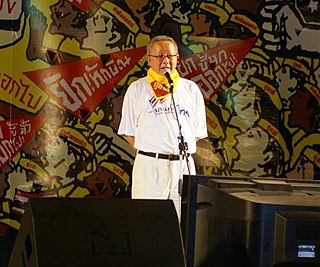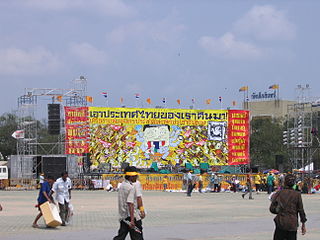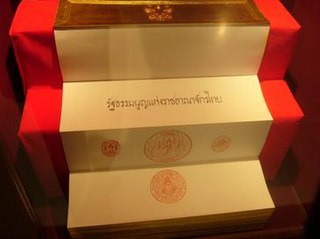Related Research Articles

Thaksin Shinawatra is a Thai businessman and politician. He served in the Royal Thai Police from 1973 to 1987, and was the Prime Minister of Thailand from 2001 to 2006.

Prem Tinsulanonda was a Thai military officer, politician, and statesman who served as the Prime Minister of Thailand from 3 March 1980 to 4 August 1988, during which time he was credited with ending a communist insurgency and presiding over accelerating economic growth. As president of the Privy Council, he served as Regent of Thailand from the death of King Bhumibol Adulyadej on 13 October 2016 until 1 December 2016, when Vajiralongkorn was proclaimed King. At the age of 98, Prem was the longest-living Thai Prime Minister. He is also the oldest regent of any country, surpassing Bavarian Prince Regent Luitpold's record, when he became the regent for king Rama X.

Sondhi Limthongkul is a Thai media mogul, conspiracy theorist, pro-Beijing anti-democracy reactionary activist, demagogue, and leader of the People's Alliance for Democracy (PAD). He was elected leader of the New Politics Party (NPP).
In 2005 and 2006, a series of events occurred in Thailand as a result of public anger with Prime Minister Thaksin Shinawatra that was supported by Sondhi Limthongkul and his coalitions. It led a military coup that concluded in the overthrow of the Thai Rak Thai government in September 2006, the flight of Thaksin after the court verdict, and the establishment of the junta government led by Surayud Chulanont, a favourite of privy councillor and senior statesman Prem Tinsulanonda.

The People's Alliance for Democracy was a Thai reactionary, monarchist political movement and pressure group. It was originally a coalition of protesters against Thaksin Shinawatra, the former Prime Minister of Thailand.

Muangthai Raisabdah is a Thai political talk show hosted by Sondhi Limthongkul and Sarocha Pornudomsak. The show is Sondhi's personal mouthpiece, and up to 2004 it praised Premier Thaksin Shinawatra. Later, when relations between the two soured, it became one of the Premier's most vocal critics. In September 2005, the show was cancelled by its broadcaster, MCOT, after Sondhi allegedly made on-air comments disrespectful to King Bhumibol Adulyadej. Sondhi started independently broadcasting his show via satellite and internet, turning tapings into rallies against the government. In February 2006, Sondhi co-founded the People's Alliance for Democracy and the show was incorporated into the PAD's anti-Thaksin rallies.

Sonthi Boonyaratglin is a Thai former Commander-in-Chief of the Royal Thai Army and former head of the Council for Democratic Reform, the military junta that ruled the kingdom. He was the first Muslim in charge of the army of the mostly Buddhist country. On 19 September 2006, he became the de facto head of government of Thailand after overthrowing the elected government in a coup d'état. After retiring from the Army in 2007, he became deputy prime minister, in charge of national security.

The 2006 Thai coup d'état took place on 19 September 2006, when the Royal Thai Army staged a coup d'état against the elected caretaker government of Prime Minister Thaksin Shinawatra. The coup d'état, which was Thailand's first non-constitutional change of government in fifteen years since the 1991 Thai coup d'état, followed a year-long political crisis involving Thaksin, his allies, and political opponents and occurred less than a month before nationwide House elections were scheduled to be held. It has been widely reported in Thailand and elsewhere that General Prem Tinsulanonda, a key person in the military-monarchy nexus, Chairman of the Privy Council, was the mastermind of the coup. The military cancelled the scheduled 15 October elections, abrogated the 1997 constitution, dissolved parliament and the constitutional court, banned protests and all political activities, suppressed and censored the media, declared martial law nationwide, and arrested cabinet members.

The Council for National Security (Thai: คณะมนตรีความมั่นคงแห่งชาติ; RTGS: Khana Montri Khwam Man Khong Haeng Chat; abbreviated CNS, was the military junta which ruled Thailand between its coup d'état against Prime Minister Thaksin Shinawatra on 19 September 2006 until the later coup d'état on 22 May 2014. Thaksin was deposed while overseas in New York City in a nonviolent coup led by Royal Thai Army Commander General Sonthi Boonyaratglin, one of Thailand's top military commanders. Martial law was declared on 19 September by General Sonthi, who stated that the action was taken in an effort to "bring back normality and harmony" and with the intent to "return power to the Thai people as soon as possible". This sentiment was echoed by King Bhumibol Adulyadej, who subsequently appointed General Sonthi to lead the governing council.
The 2006 Thai interim civilian government is the Thai provisional civilian government headed by Interim Prime Minister General Surayud Chulanont. It was appointed on 1 October 2006 by the Council for National Security, the initial post-coup interim military government led by General Sonthi Boonyaratglin, which had overthrown the government of Thaksin Shinawatra in a coup on 19 September 2006. The interim government operated under an interim constitution, promulgated that same day.

Surayud Chulanont is a Thai politician. He was the prime minister of Thailand and head of Thailand's interim government between 2006 and 2008. He is a former supreme commander of the Royal Thai Army and is currently Privy Councilor to King Vajiralongkorn.

The Constitution of the Kingdom of Thailand, Buddhist Era 2550 (2007) was the constitution of Thailand which was in effect from 2007 to 2014.

The 2006 Bangkok bombings occurred on 31 December 2006 and 1 January 2007, during New Year's Eve festivities in Bangkok, Thailand. Four explosions went off almost simultaneously in different parts of the city at around 18:00 local time, followed by several more explosions within the next 90 minutes. Two explosions also occurred after midnight. In total, eight explosions were reported during the night.
General Saprang Kalayanamitr was an officer of the Royal Thai Army, Assistant Secretary-General of the Council for National Security (CNS), Commander of the junta's 14,000-man anti-protest force, chairman of the Board of Directors of Airports of Thailand (AoT), and also Chairman of the Boards of TOT and CAT Telecom, two major Thai state-owned telecommunication companies.
The domestic policy of Surayud Chulanont as Prime Minister of Thailand affected the Thai economy, human rights, education, and numerous other areas. Appointed Prime Minister by a military junta that overthrew the government of Thaksin Shinawatra, he has been praised for his efforts to reverse the policies of the Thaksin government and to reduce the role of foreigners in the Thai economy. However, his policies have been controversial, and he been accused of economic mismanagement, rampant human rights abuses, and allowing the escalation of the South Thailand insurgency.

The United Front for Democracy Against Dictatorship (UDD), whose supporters are commonly called Red Shirts, is a political pressure group opposed to the People's Alliance for Democracy (PAD), the 2006 Thai coup d'état, and supporters of the coup. Notable UDD leaders include Jatuporn Prompan, Nattawut Saikua, Veera Musikapong, Jaran Ditapichai, and Weng Tojirakarn. The UDD allies itself with the Pheu Thai Party, which was deposed by the 2014 military coup. Before the July 2011 national elections, the UDD claimed that Abhisit Vejjajiva's government took power illegitimately, backed by the Thai Army and the judiciary. The UDD called for the Thai Parliament to be dissolved so that a general election could be held. UDD accused the country's extra-democratic elite—the military, judiciary, certain members of the privy council, and other unelected officials—of undermining democracy by interfering in politics. The UDD is composed of mostly rural citizens from northeast (Isan) and north Thailand, of urban lower classes from Bangkok, and of intellectuals. Although the movement seems to receive support from former prime minister-in-exile Thaksin Shinawatra, not all UDD members support the deposed prime minister.

Beginning in 2008, there was worsening conflict between the People's Alliance for Democracy (PAD) and the People's Power Party (PPP) governments of Prime Ministers Samak Sundaravej and Somchai Wongsawat. It was a continuation of the 2005–2006 political crisis, when PAD protested against the Thai Rak Thai (TRT) party government of Prime Minister Thaksin Shinawatra. PAD followers usually dressed in yellow, yellow being the royal color of King Bhumibol Adulyadej, and were called "yellow shirts". National United Front of Democracy Against Dictatorship (UDD) followers, known as supporters of the deposed prime minister Thaksin Shinawatra, dressed in red and were widely called "red shirts".

A series of political demonstrations and following unrest occurred in Thailand from 26 March to 14 April 2009 in Bangkok and Pattaya against the government of Abhisit Vejjajiva and the military crackdown that followed. Up to 100,000 people demonstrated in central Bangkok at the height of the protests. The crackdown is also known in Thailand as "Bloody Songkran", referring to the Thai holiday of Songkran, which takes place on 13–15 April.

Abhisit Vejjajiva was formally endorsed by King Bhumibol Adulyadej as Prime Minister of Thailand on 17 December 2008. Abhisit ascended to power during the 2007–2008 financial crisis.

The history of Thailand since 2001 has been dominated by the politics surrounding the rise and fall from power of former Prime Minister Thaksin Shinawatra, and subsequent conflicts, first between his supporters and opponents, then over the rising military influence in politics. Thaksin and his Thai Rak Thai Party came to power in 2001 and became very popular among the electorate, especially rural voters. Opponents, however, criticized his authoritarian style and accused him of corruption. Thaksin was deposed in a coup d'état in 2006, and Thailand became embroiled in continuing rounds of political crisis involving elections won by Thaksin's supporters, massive anti-government protests by multiple factions, removals of prime ministers and disbanding of political parties by the judiciary, and two military coups.
References
- 1 2 The Nation, PTV to go on air Wednesday Archived 26 February 2007 at the Wayback Machine , 28 February 2007
- ↑ The Nation, PTV says 'CAT attack' ruined debut Archived 29 September 2007 at the Wayback Machine , 2 March 2007
- 1 2 The Nation, Full gear police fail again to end PTV protest, 23 March 2007
- 1 2 The Nation, Banned PTV rally goes ahead amid scuffles with the police, 24 March 2007
- 1 2 3 Bangkok Post, PTV rally draws thousands of Thaksin backers, 24 March 2007
- 1 2 3 The Nation, Treat PTV the same as ASTV, Abhisit tells govt, 22 February 2007
- ↑ The Nation, PTV 'to employ same methods as ASTV but not biased', 28 February 2007
- ↑ The Nation, Govt must tolerate dissent Archived 29 September 2007 at the Wayback Machine , 21 February 2007
- ↑ The Nation, Thirapat's media bungles have not helped, 2 March 2007
- ↑ The Nation, Bar on PTV newsmen
- ↑ Bangkok Post, PTV sues defense minister for defamation, 25 April 2007
- ↑ ผู้จัดการออนไลน์, “สนธิ” ย้ำเหตุบึ้มไม่ใช่ฝีมือกองทัพ - โบ้ยถามหมอดูพีทีวี, 6 พฤษภาคม 2550
- ↑ The Nation, Strange bedfellows at Sanam Luang, 23 February 2007
- ↑ Bangkok Post, Military to monitor political rally, 23 March 2007
- ↑ Bangkok Post, PTV to hold weekly anti-govt rallies, 24 March 2007
- ↑ The Nation, Sonthi: Former TRT members suspected of supporting anti-govt rally, 26 March 2007
- ↑ The Nation, Thai junta chief calls for emergency rule in Bangkok Archived 13 May 2007 at the Wayback Machine , 28 March 2007
- ↑ IHT, Thai coup leaders urge the government to impose emergency rule, 28 March 2007
- ↑ Bangkok Post, 4,000 join pro-Thaksin protest, 31 March 2007
- ↑ Asia Times, Lights, camera, protest, 27 April 2007
- ↑ The Nation, Disruption 'will not be tolerated', 7 April 2007
- ↑ Bangkok Post, Military threatens crackdown again, 25 April 2007
- ↑ Bangkok Post, Six protesters held, 23 July 2007
- ↑ The Nation, PM says sorry to Prem over mob violence Archived 29 September 2007 at the Wayback Machine , July 2007